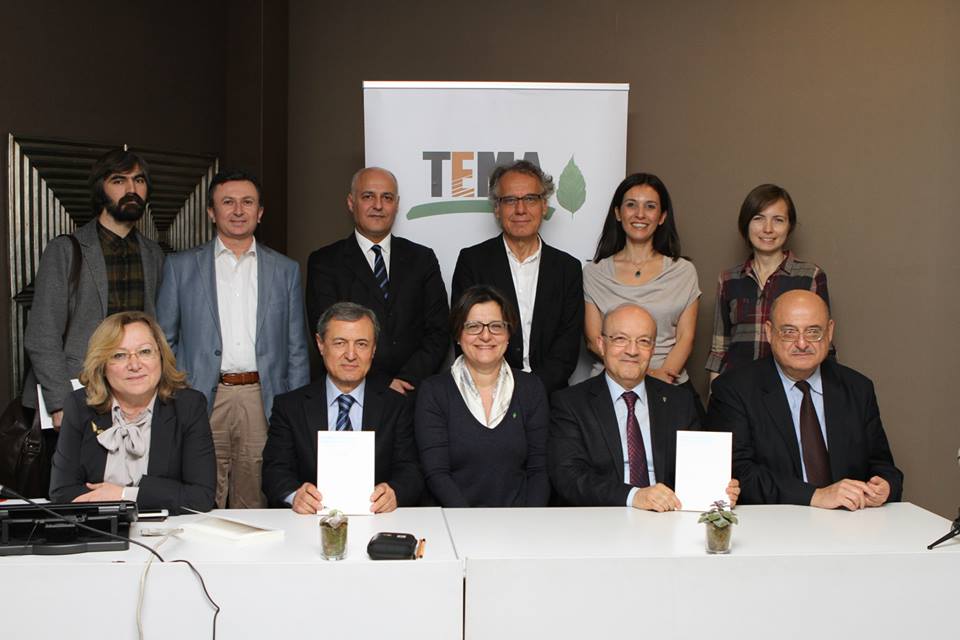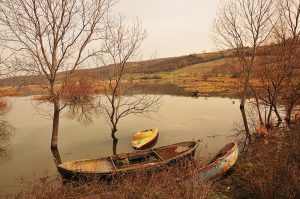The effects of the projects that will affect the future of Istanbul, the 3rd Bridge, 3rd Airport and Channel Istanbul, were accumulated in a scientific report under the leadership of TEMA. The results of the Istanbul Projects Report were shared with public at a press conference on Tuesday, 25 March 2014.
Report shows the threats of these projects on the life support systems of Istanbul such as the northern forests, water basins, agricultural and meadow lands, underground water reservoirs and biodiversity were presented. The report was prepared in 7 months with the contribution of 16 scientists.
Prof. Dr. Nuran Zeren Gülersoy (İTÜ), Prof. Dr. Doğanay Tolunay (İÜ), Prof. Dr. Emin Özsoy (ODTÜ) Prof. Dr Haluk Gerçek (İTÜ) and TEMA President Deniz Ataç attended the press conference.
Identification and assessment of the current situation:
- Access to natural assets and use of these assets are human and social rights.
- Istanbul forests are considered as one of the 200 major ecological regions worldwide and one of the 100 forests that needs to be urgently protected in Europe.
- The forests in the north of the city are very important for protecting the water basins and for enabling Northern winds to bring clean air to the city.
- The Bosporus Bridge which was built in 1973 and the connection roads to the bridge caused the city to move northwards both in population and land use wise.
- In 1988, the construction of the Fatih Sultan Mehmet Bridge and TEM access road accelerated the destruction of the rural settlements and agricultural lands in the north part of the city as well as the destruction of the fresh water sources, water catchments and the forest areas.
- On the 1/25.000 scale Zoning Plan for the North Marmara Highway, 26 junctions are planned within the 3rd Bridge and its connection roads. . These junctions will pave the way for new settlements in the area by connecting these watersheds, forests and agricultural areas with the rest of Istanbul. In this way as like in first and second bridge Istanbul will expand to the north.
- 25% of Istanbul is agricultural land. On the European side, especially on agricultural lands in Silivri and Çatalca region, it is possible to make dry or rain fed farming on 90% of the land.
- Beneficial effects of urban forests on human and human environment can be listed below: support biodiversity, to reduce atmospheric carbon levels, improve air and water quality, to avoid noise pollution, to balance hot and cold temperatures and raise awareness of people living in urban cities on ecology and support human health.
The after effects of the projects:
The values that will be lost with the construction of these projects will be more than the ones that will be created.
The total forest land that will be cut for the construction of the 3rd airport and the 3rd bridge will be 8715 hectars. This is something like 8000 football fields.
- The bridges will go on carrying the vehicles and the traffic will still be suspended. According to the projections, at rush hours, all the three bridges will be blocked by heavy traffic.
- Because of the excavations for the runway, apron and upper structure of the 3rd airport, natural forest lands and more than 70 lakes and ponds that have wildlife will be damaged. Agricultural and meadow lands and especially the creeks and streams that feed the Terkos Lake will be endangered.
- There will be a decrease in the ecosystem services provided by the forests. These services are water production, climate regulation, CO2 absorption, oxygen production, decreasing of air pollution, providing living environment for the wildlife, timber and wood production. Also habitat fragmentation will occur. Istanbul is located on one of the most important bird emigration routes which pass over Lake Terkos and the Belgrad Forest. The local and migratory birds living at these regions are under the protection of the Bern Convention. Projects that are planned to be built along the migration routes of birds, will destroy their living habitats. This will also constitute risk for airplane accidents.
- The differences that will be created on air and climate conditions with the construction of these projects, will affect the local climate first, then it will expand to the regional scale. The projects will adversely affect the heat and moisture flow, temperature, humidity, evaporation, cloud formation and wind parameters and local distribution patterns and those areas will turn into urban heat areas.
- If the Canal Istanbul project is constructed at the Sazlıdere basin, Istanbul which already has limited water resources will face a very serious threat. Terkos-Kasatura sea shore, which is among the 122 most important plant areas of Turkey, will be adversely affected by the Canal Istanbul project. The areas on which the Istanbul projects are planned to be constructed are ecologically fragile areas and must be conserved for sustainable life. These areas are the habitats of several endemic plant and animals. The projects will harm the flora and fauna of Istanbul.
- The loss of agricultural land will not be limited to the permits for construction along the route of the channel. The damage will be multiplied by the uncontrollable constructions that will be a part of the neighborhood of the channel. Canal Istanbul will harm the underground water reserves under Silivri, Çatalca and Büyükçekmece provinces that have the potential to irrigate large areas of agricultural land.
- The routes of İstanbul Trakya Railroad, TEM and E5 Highway, similar important roads will have to be shifted because of Canal İstanbul. Also the places of historical Terkos-Alibey water gallery and Ataköy waste water collector and routes of important water transmission lines will have to be changed or rerouted.
- By carrying on these projects, Turkey will be violating a lot of international conventions. The international conventions on the protection of the nature have to be applied as Turkish laws and legislations. With the realization of the bridge and its adjoining roads, a large number of international conventions will be violated.
- According to the Climate Change Convention and the Kyoto Protocol, which was signed by Turkey, although there is no obligation for a commitment to decrease greenhouse gas levels, destruction of the forests that are important agents in the absorption of carbon, is against the regulations of these conventions. For all projects, comprehensive analysis on the public benefit and ecosytem damage must be undertaken to see the pros and cons of the projects.
- It is projected that by the projects to be done at the land areas protected by the international conventions, Büyükçekmece Lake, Küçükçekmece Lake, Terkos Lake, Ömerli basin and West İstanbul meadows will be significantly damaged. In addition to these, ecosystems at important nature areas like sand dunes at Kilyos and Ağaçlı on Black sea coast, West İstanbul meadows near Alibeyköy dam, The Bosphorus, Şile coast, Ömerli basin and Pendik valley, will be damaged. While the short term economical values related to agricultural and forest lands that have direct economical profits are receiving recognition whereas the other ecosystem functions are neglected since their functions don’t carry direct economical value.
Executive Summary of the Report in English will be ready in the upcoming days.


